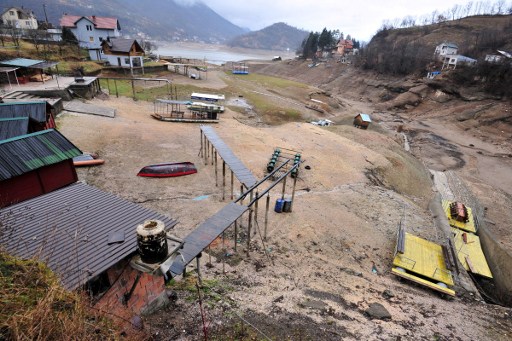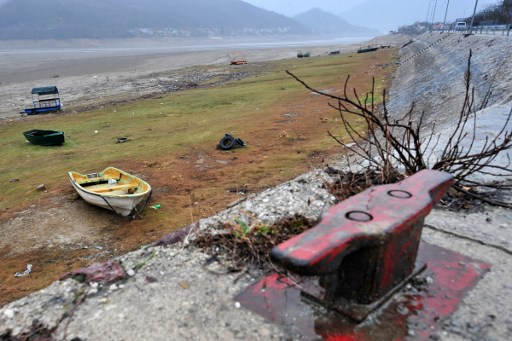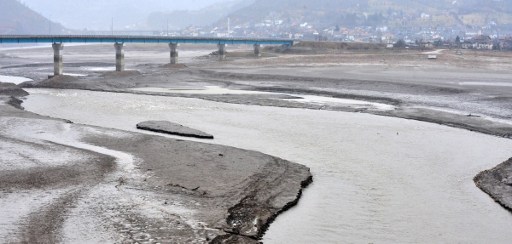by Rusmir SMAJILHODZIC
Konjic, Bosnia and Herzegovina (AFP)–
Bosnia’s fisheries watchdog gazes over an expanse of sand and mud, a space once occupied by a large thriving lake but recently emptied in the race for electricity production.
“I have nothing to do here anymore,” said Emir Alebic by the greyish valley that was once the site of the artificially formed, 30-kilometre (18-mile) long Jablanica lake on the Neretva river in southern Bosnia.
The water level should soon begin to rise again, with snow on the surrounding mountains melting and rains starting to fall after a prolonged period of drought.
But fishermen and environmental groups say the damage has been done, with stocks of “more than two million” fish, such as perch and trout, “devastated” by the sudden drop in water about 40 days ago.
They blame the national power firm Elektroprivreda BiH, which manages the Jablanica dam and the hydroelectric power station about 30 kilometres west of the lake.
“This is an ecological catastrophe,” said Hrabren Kapic, head of a local fishing association, the valley below him littered with dozens of stranded boats.

Bosnia’s fisheries watchdog gazes over an expanse of sand and mud, a space once occupied by a large thriving lake but recently emptied in the race for electricity production. The water level should soon begin to rise again, with snow on the surrounding mountains melting and rains starting to fall after a prolonged period of drought. But fishermen and environmental groups say the damage has been done, with stocks of “more than two million” fish, such as perch and trout, “devastated” by the sudden drop in water about 40 days ago. / AFP PHOTO / ELVIS BARUKCIC
He admitted that the lake’s water level had dropped in previous years — “but never like this”.
– Ecosystem in crisis –
The power firm said the drop in the lake’s level was caused by “periods of exceptional drought” between September and January as well as very low temperatures last month which increased electricity consumption.
“Despite these circumstances, the emptying of the lake was done in line with the rules and with a single objective, to meet the system’s needs,” it said in a statement.
But conservationists remain fearful for the future of the lake, for which about 700 fishing permits were issued last year.
“An entire ecosystem was brought into question,” said Amir Variscic from Bosnian environmental group Zeleni-Neretva.
According to local NGOs, some fish have been trapped and remained buried in swampy areas, while others have migrated towards the dam.
They fear the fish will not return as the microorganisms they eat have also suffered from the near disappearance of the water.

Bosnia’s fisheries watchdog gazes over an expanse of sand and mud, a space once occupied by a large thriving lake but recently emptied in the race for electricity production. The water level should soon begin to rise again, with snow on the surrounding mountains melting and rains starting to fall after a prolonged period of drought. But fishermen and environmental groups say the damage has been done, with stocks of “more than two million” fish, such as perch and trout, “devastated” by the sudden drop in water about 40 days ago. / AFP PHOTO / ELVIS BARUKCIC
According to Variscic, the lake’s level drops every year by around a third, but this time it has almost dried up.
He accused the national power company of an “exacerbated desire” to “transform each litre of water into a kilowatt, in a period of exceptionally high electricity prices in the market due to a bad hydrological situation in the region”.
Bosnia, a poor Balkan country whose industry has still not recovered from its devastating 1990s civil war, has one source of wealth — its rivers.
The country is one of the few exporters of electricity in southeastern Europe, bringing 165 million euros ($176 million) into the state’s coffers last year.
But officials say only 30 percent of Bosnia’s hydroelectric potential is being used.
– ‘Extreme situation’ –
Following complaints from fishing groups, the authorities have begun an on-site investigation.
And Elektroprivreda BiH ordered its own report, asking a biology professor at Sarajevo University, Samir Djug, to look into possible damage.
Djug warned of an “extreme situation” due to “extreme dryness” but said water life was adaptable and that the fish “will return if they are alive”.
“This situation could have negative effects on biodiversity, especially fish, but also other animals.”

Bosnia’s fisheries watchdog gazes over an expanse of sand and mud, a space once occupied by a large thriving lake but recently emptied in the race for electricity production. The water level should soon begin to rise again, with snow on the surrounding mountains melting and rains starting to fall after a prolonged period of drought. But fishermen and environmental groups say the damage has been done, with stocks of “more than two million” fish, such as perch and trout, “devastated” by the sudden drop in water about 40 days ago. / AFP PHOTO / ELVIS BARUKCIC
Zoran Mateljak, who represents the World Wildlife Fund in Bosnia, says the threats go well beyond Jablanica.
He is worried about plans to build other hydroelectric facilities including “hundreds of mini power plants” across the country.
He is particularly concerned about a huge project slated in the southeast, which he says would endanger the Hutovo Blato nature reserve, home to about 160 bird species and a winter shelter for many migratory birds.
“It would mean total disaster” for the park, he said.
rus/ng/ljv/rob/hmw/boc/iw
© Agence France-Presse







